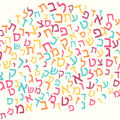 You Know More Hebrew Words Than You Think
You Know More Hebrew Words Than You Think
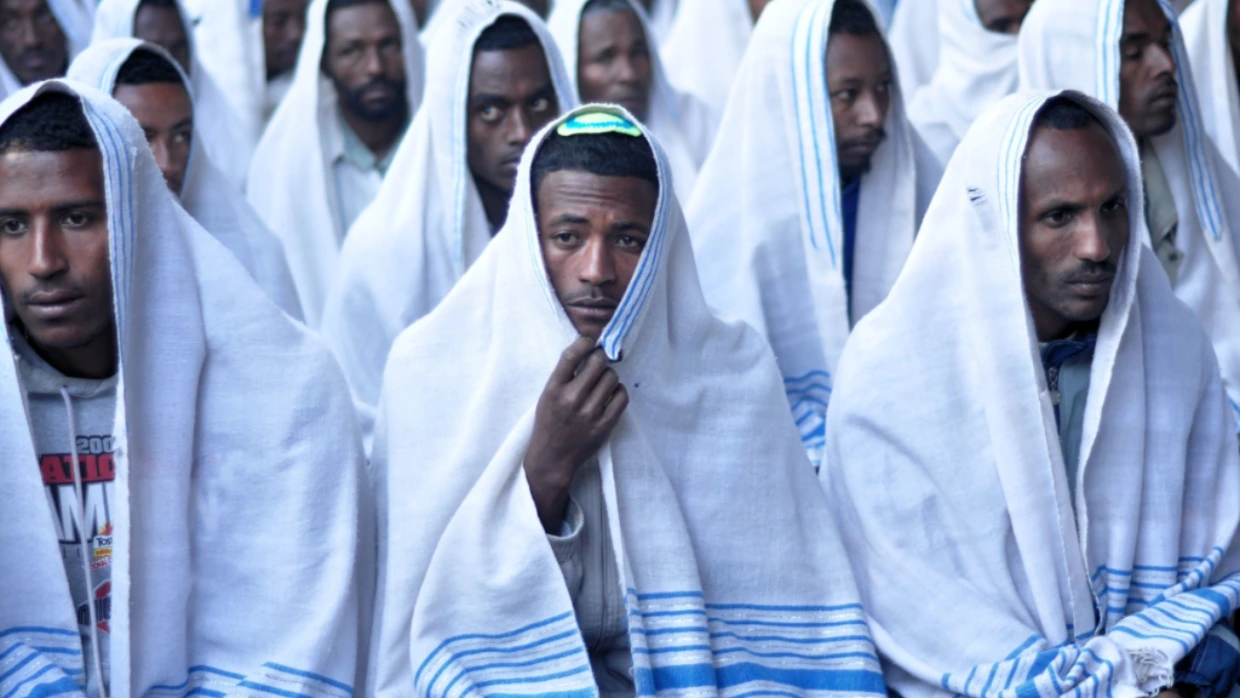

7 min read
What happened to the ten tribes and where are they today?
Biblical archaeology has come a long way over the past century and a half. Discoveries in modern times have unearthed ancient cities, houses, temples, stone tablets, burial caves, coins, jewelry, clothing, weapons, and more, all testifying to what life really was like during the Biblical period.
There are some explorers who are searching for the ten lost tribes of Israel, the majority of the Jewish Nation who were conquered, forcibly displaced, presumably assimilated into other nations and lost contact with the rest of world Jewry over the centuries. In recent years, there has been a renewed enthusiasm in this search among certain native peoples of Asia, Africa, and beyond who retain traditions, customs, and historical memories connected to the Jewish People. But first, some historical context.
The founding father of the Jewish nation was Abraham. The family legacy of monotheism (later to be known as Judaism) was passed on to his son Isaac who passed it on to his son Jacob who was given an alternative name, Israel. Israel had 12 sons; Reuben, Simon, Levi, Judah, Dan, Naphtali, Gad, Asher, Issachar, Zebulun, Joseph, and Benjamin. During a global famine, the family migrated to Egypt where they significantly multiplied. The 12 sons of Israel developed into the 12 tribes of Israel, otherwise known as the Children of Israel, which is how the Bible most often refers to the Jewish People. (The tribe of Joseph actually became two tribes, descendants of his two sons, Ephraim and Manasseh.)
The 12 tribes eventually inherited 12 portions of territory within the Land of Israel and this remained so for centuries. About 3000 years ago, the 12 tribes were united into a unified political entity led by King David and was inherited by his son King Solomon. This unified Jewish monarchy lasted about 73 years and was called the Kingdom of Israel.
With the succession of Solomon’s son Rehoboam, only two of the tribes, Judah and Benjamin, located in the south of the country, remained loyal to the Davidic dynasty while the other 10 tribes came under the leadership of a tax collector from the tribe of Ephraim known as Jeroboam. The realm of Jeroboam retained the namesake, the Kingdom of Israel since it included most of the Israelite tribes, and the realm of Rehoboam was known as the Kingdom of Judah, since the tribe of Judah was much larger than Benjamin.
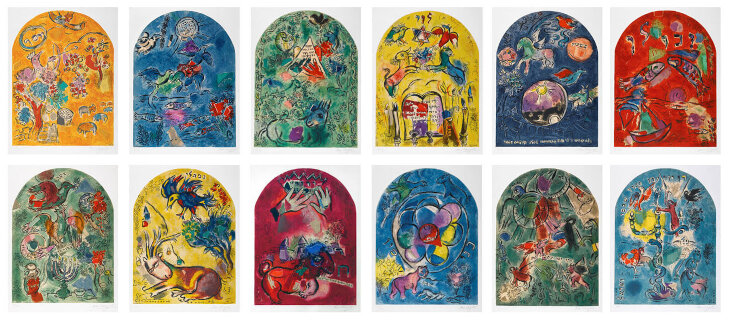 The Chagall Windows depicting Jacob’s 12 sons
The Chagall Windows depicting Jacob’s 12 sons
The two Jewish kingdoms, Judah and Israel, sometimes went to war with each other and other times cooperated with one another both for trade purposes and to combat mutual external threats. In the year 722 BCE, the Assyrian Empire defeated the Kingdom of Israel and forcibly deported most of its population. The question that has piqued the interest of scholars for generations is: What happened to the ten tribes? Where did they end up and who are they today?
The Bible does give some clues as to destination points of their deportations from ancient Israel: “In the ninth year of Hoshea, the king of Assyria took Samaria and exiled the Israelites to Assyria, and he repatriated them in Halah, and in Habor, the Gozan River, and the cities of Media” (Kings II 17:6).
Clearly, the general area we’re talking about here refers to the Assyrian homeland in what is today northern Syria, northern Iraq and northwestern Iran, in other words modern day Kurdistan. Although the Biblical place names are contested, the reference to “the cities of Media” are commonly understood to be in the region of Hamadan, Iran. Although there are no traces of the lost tribes in that area, it could have been a starting point for a migration further to the east.
The Pashtun tribes of Afghanistan and Pakistan who migrated to the area in ancient times from northwestern Iran, have long intrigued seekers of the ten lost tribes. On the surface, this is a group of 25 million people practicing a stringent form of Sunni Islam. Many members of the Pashtun are actually associated with the Taliban so it’s not exactly the first place you would expect to find lost Jewish tribes, but there’s more to it.
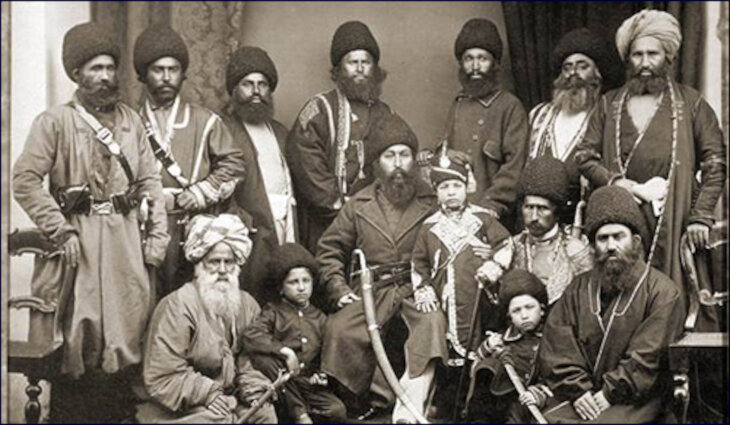
The Pashtun do have historical memories of their ancestors originating in ancient Israel. Their tribal names very much resemble Israelite tribal names; Rubeni, Gadi, Ashuri, Efridi, Shinwari, Lewani, and Yousefzai. Many Pashtun people have a distinct Semitic appearance in contrast to other tribes of Afghanistan and Pakistan. They circumcise male babies on the eighth day, women light candles on Friday night, they practice levirate marriage, and even have cities of refuge as mandated by Biblical law. Unlike typical Muslim custom, the Pashtun move back and forth when they read the Koran in a similar manner to Jews who engage in prayer and Torah study. Many of the Pashtun also have sidelocks similar to Orthodox Jews. Interesting connections!
Within India, there are several groups who claim descent from the ten tribes including the Bene Israel, the Bene Ephraim, and Bene Menashe. The Book of Esther seems to indicate that there were Jewish populations in all the provinces of King Ahasuerus: “It was written according to all that Mordecai commanded, to the Jews and to the satraps and the governors, and the princes of the provinces from India to Ethiopia” (Esther 8:9).
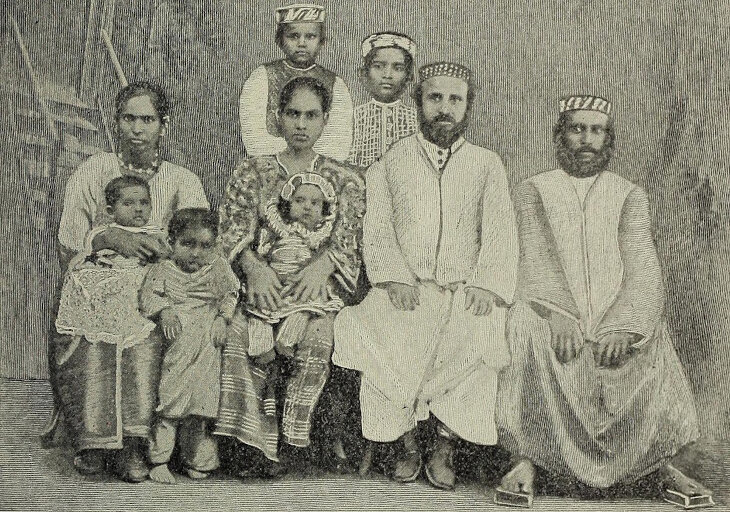 Jews of Cochin, A Malabar Jewish family (1900)
Jews of Cochin, A Malabar Jewish family (1900)
All these groups practiced the most basic levels of Judaism, circumcision and Shabbat, without retaining much more knowledge of their Jewish roots. Between the 18th and 20th centuries, these groups became increasingly in contact with world Jewry and started practicing Judaism to a greater extent. In the aftermath of Israeli independence, large chunks of these populations have immigrated to Israel, but many remain behind.
The Beta Israel tribes of Ethiopia have long been theorized to be members of the ten lost tribes. According to one local tradition, they are descendants of the tribe of Dan who left ancient Israel prior to the exile. Another tradition places their origins in the union between King Solomon and the Queen of Sheba whose visit to Jerusalem was recorded in the Book of Kings.

Interestingly enough, the Judaism practiced by Ethiopian Jews distorted certain Jewish customs like family purity. Ethiopian Jews also were not familiar with the common Jewish custom of tefillin (phylacteries), which is practiced by men. This points to a Judaism that could have been taught by a Jewish woman following her conversion, someone like the Queen of Sheba. Reference to Jewish communities in northeast Africa is even recorded by the Prophet Isaiah: “And it shall come to pass that on that day, the Lord shall continue to apply His hand a second time to acquire the rest of His people, that will remain from Assyria and from Egypt and from Pathros and from Cush and from Elam and from Sumeria and from Hamath and from the islands of the sea” (Isaiah 11:11).
Pathros is understood to be southern Egypt and Cush is interpreted either as Sudan or Ethiopia.
There are in fact dozens of ethnic groups around the world who claim Israelite origins, some with stronger cases and others with less evidence. Highlighted above are just the most common cases. It’s interesting to note that today’s Jewish population of some 15 million is not much more than it was 3000 years ago. As we uncover more and more ethnic groups with ties to ancient Israel, we are perhaps seeing a Jewish family reunion on a massive scale the likes of which were spoken by the prophets:
“So says the Lord God: Behold I will take the stick of Joseph, which is in the hand of Ephraim and the tribes of Israel his companions, and I will place them with him with the stick of Judah, and I will make them into one stick, and they shall become one in My hand” (Ezekiel 37:19).

Hey, no mention of the passage in the apocryphal text of 2Esdras that gives the description of some of the lost tribes of Israel (lost 10) making their way to North America, making some if not all the North American Native Americans Israelites. That with them having a great deal of traditions that align with Torah.
The afghan tribes,were the efforts to reach out to them over the years or did they turn hostile?
Interesting read thank you!
Herbert Armstrong and his son garner Ted Armstrong argued, for decades, that the Angles and Celts of Britain were two of the lost tribes of israel. Do any of the Jewish scholars doing this research today concur?
Yair Davidiy of Brit-Am is an Orthodox Jew living in Beitar-Ilit in the area of Judah, in Israel. Yair was written several books on the subject, hundreds of articles, along with web-sites and Video Clips. See: https://hebrewnations.com/
...and Isaiah also, in the same passage, said that people from Pathos, Cush, Sumerian, Elam, and Hamath would be part of the ingathering of Jews to what is now Israel. It's a breathtaking and an inspiring prediction.
you forgot to mention that while Levi was one of the original 12 sons of Israel, it was the only tribe to NOT have a parcel of land, otherwise there would have been 12 sons of Israel, minus 1 for Joseph, but add 2 for Joseph's sons, which would bring the total number of tribes to 13.
If these ex-Jews and half Jews were to join the Jewish nation it would make us very strong instead of being a minority because of our lack of followers. Imagine how powerful Israel would become if they had a coalition with 25 million Pashtun.
Thank you for the informative article. A quick read which I'll be processing for a while.
Additionally, appreciate the comments as a learning experience too. Thank you.
The Lost Ten Tribes are to be found among Western peoples especially the British and related ethnicities. The exiled Israelites were to become one of the most numerous and powerful groups of people on earth (Genesis 15:5, 22:17, 24:60, 32:12, Numbers 23:10, Deuteronomy 1:11, Isaiah 10:22, 24:16, 26:15, Hosea 1:10); etc,. Rashi (on Obadiah 1:18) said the Lost Ten Tribes were in France. Ramban (Nachmanides) said they were in Tsrefat meaning, he said, at the far north, The Hatam Sofer said that the areas of Britain and Western Europe were to belong to Israel in the End Times. Numerous other proofs exist.
100% agree with you, Yair. Thank you (also, I really do wish that various writers would stop referring to all Twelve Tribes as "Jewish". Jewish refers only to the Tribe of Judah, and Judah alone. The term "Israelites", when referring to all Twelve Tribes, would be far more correct) .... Shalom ... Keith, UK
YES! and thank you for pointing out that all tribes are referred to as Jewish, which as you stated, only refers to the Tribe of Judah!
Couldn't a DNA test help? My own Ashkenazi DNA and that of my children and ex-husband showed up clearly when we got tested by an ancestry website. I don't know whether Sephardi DNA is as clearly defined, but we also got lots of Spanish and Portuguese DNA, presumably from my mother's Dutch Sephardi father. It is a truly interesting subject.
Sincere thanks to Avi Abrams for this wonderful article! Chazak VeAmatz!
and what about Japan? clearly the largest concentration in the world of descendants of Jews. The body temperament ("mezeg guf") of majority of Japanese people starting with the Emperor family is exactly the same as Bnei Israel of the past and today. Same can be said about the British Royals and millions of Brits. It is a unique temperament that is very small in number (3%-10% of the world population).
Isn't it prophesied that when the Moshiach comes, all the lost tribes will return to the land of Israel? Doesn't that make it important to identify the descendents of the 10 lost tribes?
All 12 tribes did not settle in Israel. Reuben, Gad, and Manasseh stayed east of the Jordan and did not enter Israel. Everyone knows that. How could the author get that wrong?
The tribes that settled east of the Jordan were Israelites, therefore that region was part of ancient Israel. Don't think in terms of today's Israel, which is much smaller than then ancient Israel.
I think it is fascinating to learn about the history and connections....we are all related so why are we fighting?
Linda, Indeed the Jewish People are one Guf - compared to one Body. As you rightly write: "we are all related. . . etc". Furthermore, when one part of the Guf-body hurts (eg. a sore toe/ingrown toenail, etc) the whole body feels the pain! So, sincerely pray:
"Dear G-d! Don't send us troubles to unite us (as is the case with the our poor, dear brethren who are hostages in the hands of evil terrorists)! Please, please, send us wisdom and genuine love in order to appreciate each other and accept our differences of opinion, ideology, and-or level of religiosity"... Deep down we truly love each other! Let's show our love and concern.
Amen, Susan, Amen!
The fact that a group is genetically related to another group means nothing with regard to war. Take the American Civil War, or any civil war. Economic reasons, poli tical leanings, need for land to support a population, religion, are reasons for war, no matter how closely two groups are related.
Wasn't Moses's wife from Cush & didn't she & their sons return to her father's house after she & Moses had the argument?
The Torah initially states that Moses' wife (Tziporah) was the daughter of Yisro -- who was NOT from Cush. Based upon that, the Midrash states that the description of Tziporah as Cushis is only meant figuratively.
Further, she was not sent "back" because of an argument but because Aaron (brother of Moses) -- when he met Moses returning to Egypt with Wife and Children, pointed out that bringing a wife and child RIGHT NOW to Egypt was simply not "appropriate"....
I am fascinated tracing my roots to Kurdistan Barazini family needs Multiple Rabbis in to late1400's. I am named after Ovadia Barazini. . Early 1900's. Last of our known FAMILY RABBIS,
Interesting but only a theory..
How about DNA??
I was surprised the DNA story was not also included here, such the reliable evidence of the Kohein male haplotype present in select African populations that also have oral traditions of Jewish ancestry (e.g Lemba and Igbo).
Rabbi Abrams has done a great service to all of us who have wondered about this very question. His scholarship is to be much commended. Thank you.
Very interesting, informative and well written!